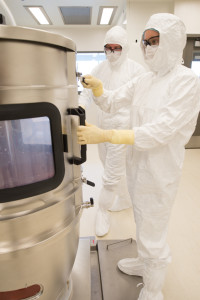[masterslider id=”118″]
Colorado State University’s Biopharmaceutical Manufacturing and Academic Resource Center (BioMARC) has been awarded a 10-month, $4.6 million contract funded by the Department of Defense (DoD) to help develop and manufacture new vaccines to fight viruses that cause inflammation of the brain.
The award is an extension of the successful work already performed at BioMARC on Ebola and Marburg vaccines.
BioMARC, a high-containment biopharmaceutical unit launched by CSU in 2006, has been successfully meeting milestones set last year by the DOD for the Ebola and Marburg vaccines, and the new funding will be used to develop vaccines for three additional viruses, specifically those for Western, Eastern and Venezuelan Equine Encephalitis viruses. These mosquito-borne viruses are in the Alphavirus genus and each can cause severe long-term disease and possibly death in humans. There currently are no licensed U.S. Food and Drug Administration-approved human vaccines or therapeutics to protect against or treat such viral infections. BioMARC’s new Alphavirus vaccine project adds to CSU’s longstanding contributions to the understanding and cure of mosquito-borne infectious diseases.

Protecting soldiers
The subcontract was awarded by Battelle, a research organization that serves the DOD Medical Countermeasure Systems Joint Vaccine Acquisition Program (MCS-JVAP). Among MCS-JVAP’s requirements is to develop vaccines to protect soldiers from aerosolized exposure to the viruses.
BioMARC will produce the vaccines using a viral replicon particle (VRP) technology that works in a variety of ways to better immunize individuals. The VRP itself is a re-engineered non-infectious virus used to deliver and present the antigen that prompts the body to create the antibodies that fight an invading virus.
“I believe that this second award reflects a level of confidence in our program by the DoD,” said Dennis Pierro, BioMARC’s director and an assistant professor of microbiology, immunology and pathology at CSU. “Our facilities and staff are very well suited to help with product types such as VRP vaccines that are created using advanced biotechnology methodologies. With this infrastructure, BioMARC at CSU plays an important role in the creation of the next generation of vaccines.”
Other possible uses
While the primary purpose of the vaccines would be to protect U.S. soldiers, it is possible that such vaccines could be used for endemic outbreaks as well.
“BioMARC is a key strategic investment by CSU that provides critically needed advanced biomanufacturing innovations for early stage development of novel medical countermeasures,” said CSU Vice President for Research Alan Rudolph. “We already have FDA approval for commercial manufacturing, a great asset for educating our students in aspects of compliance and regulation as well as providing commercial partners a unique facility to drive new ideas and early products into reality.”

BioMARC has approximately 30 full-time employees and about 12 CSU students who will be working at the facility. Members of Colorado’s Joint Budget Committee toured the facility where the work is being done in September. The project will run through May 2016.
About MCS
The role of MCS is to provide U.S. military forces and the nation with safe, effective and innovative medical solutions to counter chemical, biological, radiological and nuclear threats. MCS facilitates the advanced development and acquisition of medical countermeasures and systems to enhance the nation’s biodefense response capability.
About BioMARC
BioMARC is a nonprofit contract manufacturing organization that specializes in manufacturing biological products classified by the Centers for Disease Control and Prevention as requiring higher containment, with a Biosafety Level 3 rating, due to the safety profile of some of the materials.